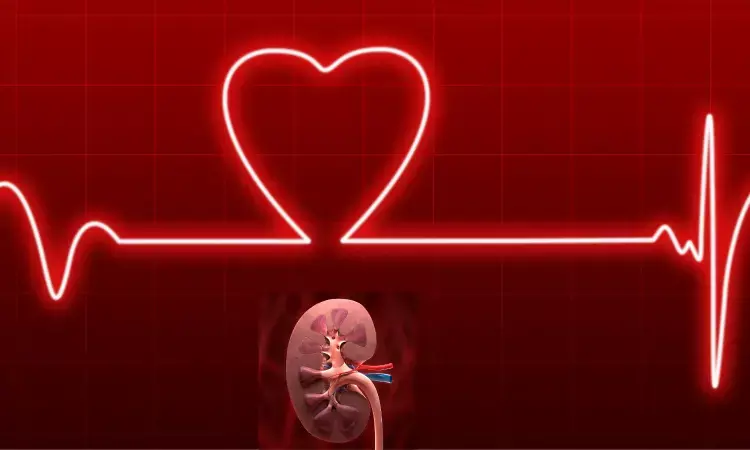- Home
- Medical news & Guidelines
- Anesthesiology
- Cardiology and CTVS
- Critical Care
- Dentistry
- Dermatology
- Diabetes and Endocrinology
- ENT
- Gastroenterology
- Medicine
- Nephrology
- Neurology
- Obstretics-Gynaecology
- Oncology
- Ophthalmology
- Orthopaedics
- Pediatrics-Neonatology
- Psychiatry
- Pulmonology
- Radiology
- Surgery
- Urology
- Laboratory Medicine
- Diet
- Nursing
- Paramedical
- Physiotherapy
- Health news
- Fact Check
- Bone Health Fact Check
- Brain Health Fact Check
- Cancer Related Fact Check
- Child Care Fact Check
- Dental and oral health fact check
- Diabetes and metabolic health fact check
- Diet and Nutrition Fact Check
- Eye and ENT Care Fact Check
- Fitness fact check
- Gut health fact check
- Heart health fact check
- Kidney health fact check
- Medical education fact check
- Men's health fact check
- Respiratory fact check
- Skin and hair care fact check
- Vaccine and Immunization fact check
- Women's health fact check
- AYUSH
- State News
- Andaman and Nicobar Islands
- Andhra Pradesh
- Arunachal Pradesh
- Assam
- Bihar
- Chandigarh
- Chattisgarh
- Dadra and Nagar Haveli
- Daman and Diu
- Delhi
- Goa
- Gujarat
- Haryana
- Himachal Pradesh
- Jammu & Kashmir
- Jharkhand
- Karnataka
- Kerala
- Ladakh
- Lakshadweep
- Madhya Pradesh
- Maharashtra
- Manipur
- Meghalaya
- Mizoram
- Nagaland
- Odisha
- Puducherry
- Punjab
- Rajasthan
- Sikkim
- Tamil Nadu
- Telangana
- Tripura
- Uttar Pradesh
- Uttrakhand
- West Bengal
- Medical Education
- Industry
Abnormalities in heart structure and function may increase risk of advanced CKD requiring kidney replacement therapy

abnormalities inhad a greater risk of progression to advanced CKD that required kidney replacement therapy
An original investigation has highlighted a significant correlation between Cardiac structure and function and the risk of KFRT (kidney failure with replacement therapy).
This study entitled “Cardiac Structure and Function and Subsequent Kidney Disease Progression in Adults With CKD: The Chronic Renal Insufficiency Cohort (CRIC) Study” was published in the American Journal of Kidney Diseases.
Cardiorenal syndrome means “heart-kidney crosstalk”, meaning a spectrum of disorders involving both the heart and kidneys: dysfunction in 1 organ induces acute or chronic dysfunction in the other organ.
Investigating further, researchers examined the association of cardiac function and structure with the risk of KFRT in the chronic kidney disease (CKD) population. They included 3,027 participants with a mean age of 59 years, including 54 % men and a mean eGFR of 43 ml/min/1.73m2 from the Chronic Renal Insufficiency Cohort Study.
To assess cardiac structure and functions by echocardiography, they included the following variables:
- Left ventricular mass index (LVMI)
- LV volume
- Left atrial (LA) area
- Peak tricuspid regurgitation (TR) velocity
- Left ventricular ejection fraction (EF)
The primary and secondary Outcomes were Incident KFRT and annual eGFR slope.
The results of the study could be summarised as:
- The follow-up duration was 9.9 years.
- Eight hundred eighty-three patients developed KFRT.
- Higher LVMI, LV volume, LA area, peak TR velocity, and lower EF were related to an increased KFRT risk.
- The corresponding HRs for the highest vs lowest quartiles of 1.70, 1.50, 1.43, 1.45 and 1.26, respectively.
Considering the secondary outcome, participants in the highest vs lowest quartiles had faster eGFR decline, except for LA area ; ΔeGFR slope per year, -0.57 mL/min/1.73m2 for LVMI, -0.25 mL/min/1.73m2 for LV volume, -0.01 mL/min/1.73m2 for LA area, -0.42 mL/min/1.73m2 for peak TR velocity, and -0.11 mL/min/1.73m2 for EF, respectively.
The possibility of residual confounding was the limitation of the study.
Concluding further, they said there is a significant association between Multiple aspects of cardiac structure and function and KFRT risk.
The causal pathway is the same for cardiac abnormalities and KFRT incidence, related to the interaction between hypertension, heart failure, and coronary artery diseases.
Further reading:
Cardiac Structure and Function and Subsequent Kidney Disease Progression in Adults With CKD: The Chronic Renal Insufficiency Cohort (CRIC) Study Published: March 17, 2023DOI:
https://doi.org/10.1053/j.ajkd.2023.01.442
BDS, MDS in Periodontics and Implantology
Dr. Aditi Yadav is a BDS, MDS in Periodontics and Implantology. She has a clinical experience of 5 years as a laser dental surgeon. She also has a Diploma in clinical research and pharmacovigilance and is a Certified data scientist. She is currently working as a content developer in e-health services. Dr. Yadav has a keen interest in Medical Journalism and is actively involved in Medical Research writing.
Dr Kamal Kant Kohli-MBBS, DTCD- a chest specialist with more than 30 years of practice and a flair for writing clinical articles, Dr Kamal Kant Kohli joined Medical Dialogues as a Chief Editor of Medical News. Besides writing articles, as an editor, he proofreads and verifies all the medical content published on Medical Dialogues including those coming from journals, studies,medical conferences,guidelines etc. Email: drkohli@medicaldialogues.in. Contact no. 011-43720751


